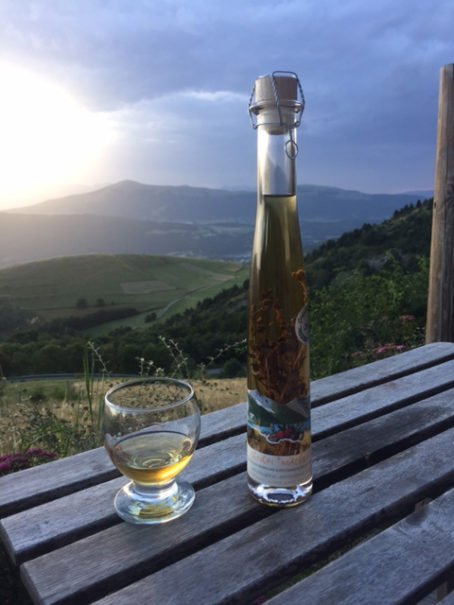
The Minty Appeal of Absinthe’s Forgotten Cousin

The Minty Appeal of Absinthe’s Forgotten Cousin
Génépi in France
Sure, the wine’s great, but when I’m in France, it’s all about the regional liqueur scenes. In Normandy and Brittany, it’s apple-based pommeau and Calvados. In the Gers region of the southwest, it’s floc and Armagnac, made from local vines. And a Mediterranean afternoon isn’t the same without an opaque glass of pastis, one little ice cube bobbing at the top. But in the Alps, I go for génépi, the rustic, often forgotten cousin of absinthe and Chartreuse.
The French Alps aren’t really wine country, which isn’t to say that they don’t produce anything good—simply that they don’t produce much, or much for which people travel very far. Driving the switchback roads of the mountains, I see billowing wheat fields. Walking along its high ridges, I see wild génépi lining the trails. So up here, I’m in the mood for beer and a cold herbal chaser. Local Alpine breweries combine the two into a génépi-infused beer, but I could never take the plunge for something that looked like the dregs of a keg cup the morning after St. Patty’s Day.
Nothing really distills the essence of a late evening in peak summer quite like génépi. First there’s the color, or colors: depending on production technique, génépi can be clear, amber, golden yellow, or as green as mouthwash. In other words, the hues of wheat fields, wildflowers, mountain meadows, lacy clouds, and the odd remnant of snow tucked in a rocky crevasse. My first sips remind me, too, of the temperamental changes in weather here. There’s the initial boozy heat followed quickly by a uniquely minty, herbal coolness that I’ve only ever tasted in wormwood. I like the macerated kinds best; seeing the herbs resting in the bottle only adds to the atmosphere. In general, I avoid the varieties that look like Scope. They taste like it, too, only you have to swallow.
If the génépi is served cold, I don’t notice its bite—reminiscent of its more famous cousin, absinthe. It’s syrupy, so it coats my mouth and lingers there a while. If only a summer in the Alps would, too.